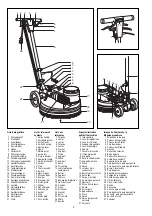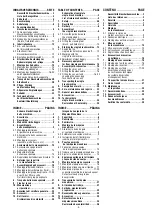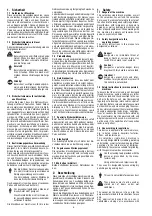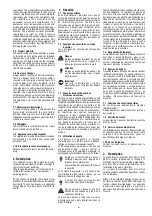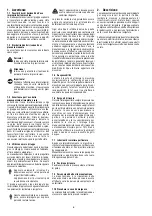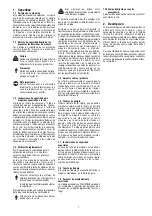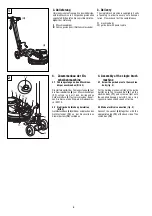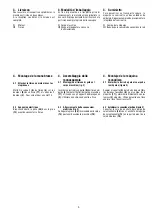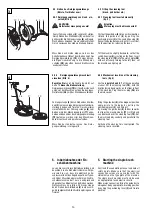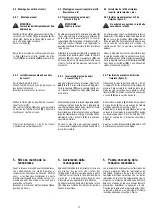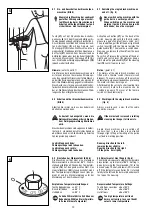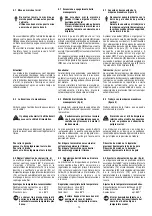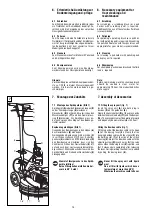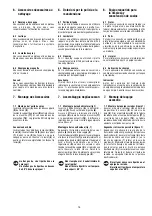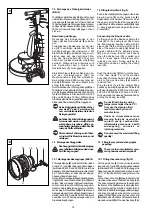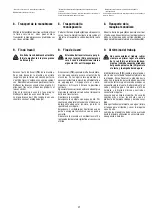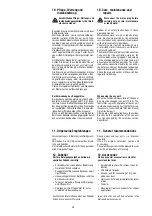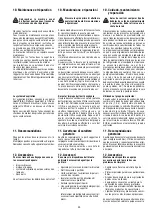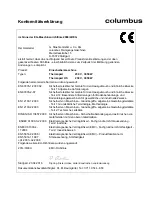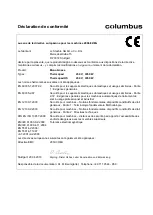
12
5
5.1 Ein- und Ausschalten der Einscheiben-
maschine (Bild 5)
Niemals die Maschine bei senkrecht
gestellter Führungsstange einschal-
ten! Maschine beim Einschalten und
Arbeiten mit beiden Händen fest und
sicher führen, nicht verkrampfen!
Taste
(27)
auf der Rückseite des Schalter-
gehäuses
(4)
mit dem Daumen betätigen (Si-
cherung gegen unbeabsichtigtes Einschalten!).
Anschliessend zusätzlich den linken oder rech-
ten Schalthebel
(3)
mit den Fingern zum
Führungsgriff
(1)
ziehen. Die Maschine ist nun
eingeschaltet. Sie können jetzt den Daumen von
der Taste
(27)
nehmen. Zum Ausschalten den
betätigten linken oder rechten Schalthebel
(3
)
loslassen. Maschine am Führungsgriff
(1)
bis
zum Stillstand des Reinigungswerkzeuges
(19)
jedoch weiter festhalten.
5.1 Switching the single brush machine on
and off. (fig. 5)
Never switch on the machine with the
guide bar in a vertical position!
When switching on the machine and
working it guide it firm and sure with
both hands, do not be cramped!
Activate push button
(27)
on the back of the
switch housing
(4)
with the thumb (safety
measure against unintentional switch on!).
Then, in addition, pull the left hand or right hand
switch lever
(3)
with the fingers towards the
guide handle
(1)
. The machine is switched on.
Now you can remove the thumb from the push
button
(27).
To switch off release the activated left hand or
right hand switch lever
(3)
. However, keep a
firm hold on the guide handle
(1)
of the cleaning
tool
(19)
until it comes to rest.
Notice:
(point 5.1)
The motors of the single brush machines are
fitted with a thermo switch (thermal circuit
breaker). The same switches off the machine
automatically when overloaded thus protecting
the motor coil from burning out.
After breaking the current a short cooling time
is necessary before the machine can be
switched on again. The reset of the thermo
switch will be automatically.
Hinweis:
(unter Punkt 5.1)
Die Motoren der Einscheibenmaschinen sind
mit einem internen thermischen Wicklungs-
schutz ausgestattet. Dieser schaltet die Maschi-
ne bei Überlastung automatisch ab und schützt
damit die Motorwicklung gegen Durchbrennen.
Nach Auslösen ist eine gewisse Abkühlzeit er-
forderlich, bevor die Maschine wieder einschalt-
bar ist. Die Rückstellung des thermischen Wick-
lungsschutzes erfolgt automatisch.
5.2 Arbeiten mit der Einscheibenmaschine
(Bild 5)
Arbeiten Sie immer so, dass das Kabel nicht
überfahren werden kann.
Es besteht Lebensgefahr, wenn die
Netzanschlussleitung mit sich drehen-
dem Reinigungswerkzeug überfahren
wird.
Einscheibenmaschinen sind sogenannte Selbst-
läufer, d. h. sie werden durch leichtes Anheben
oder Absenken der in Arbeitsstellung fixierten
Führungsstange gesteuert.
Laufrichtung nach links:
Führungsstange leicht absenken.
Laufrichtung nach rechts:
Führungsstange leicht anheben.
5.2 Working with the single brush machine
(fig. 5)
Always work in such a way, that the cable
cannot be crossed.
If the mains lead is crossed a rotating
cleaning tool danger to life exists.
Single brush machines are so called self
runners, that is to say they are controlled
through slight lifting or lowering of the guide
bar fixed in working position.
Running direction to the left:
lower guide bar slightly,
Running direction to the right:
lift the guide bar slightly.
5.3 Einstellen der Wärmezufuhr (Bild 6)
Die Maschine verfügt über eine stufenlose
Wärmevorwahl bis zu maximal 85° C. Die Ein-
stellung erfolgt durch Drehen des Temperatur-
reglers
(14)
auf den gewünschten Wert. Das
Heissluftgebläse
(22)
ist ausgeschaltet, wenn
der Temperaturregler
(14)
ganz nach links ge-
dreht ist und die Strichmarkierung unter der
Markierung auf dem Gehäuse liegt.
Empfohlene Temperatureinstellungen:
Textile Bodenbeläge ca 50° C
Kunststoffböden
ca. 65° C
Hartböden
ca. 85° C
Zu hohe Wärme führt zu Schäden am
Bodenbelag. Wählen Sie im Zweifels-
fall eine kleinere Temperatur!
press
27 3
3
1
2
4
8
6
40
60
50
14
0
5.3 Adjustment of Heat Supply (fig. 6)
The machine disposes of a stepless temperature
preselection up to maximal 85°C. Setting is
done by turning the thermoswitch (14) to the
desired value. The hot-air blower (22) is turned
off if the temperature controller (14) is turned
totally to the left and the bar mark is underneath
the tag on the housing.
Recommended Temperature Settings:
Textile floor coverings about 50°C
Plastic floors
about 65°C
Hard floors
about 85°C
Too high temperature will feed
harms on flooring. In case of doubt
select a lower temperature.


